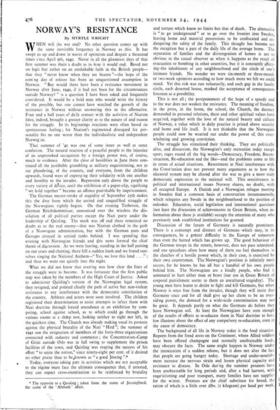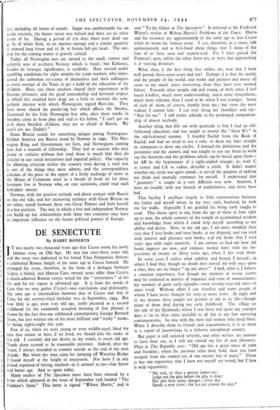NORWAY'S RESISTANCE
By MYRTLE WRIGHT * The opposite to a Quisling - taken from the name of jossingfjord, the scene of the Alunark ' affair.
WHEN will the war end? No other question comes up with the same inevitable frequency in Norway as this. It has swept us up and down in waves of optimism and despair a thousand times since April 9th, 1940. Never in all the gloomiest days of that first summer was there a doubt as to how it would end. Based not on logic but rather on an unshakable faith in the British people— that they " never know when they are beaten "—the hope of the coming day of release has been an unquestioned assumption in Norway. " But would there have been a resistance movement in Norway after June, 1940, if it had not been for the circumstances outside Norway? " is a question I have been asked and frequently considered. It would be a bold man who would write the history of the possible, but one cannot have watched the growth of the resistance in Norway without answering this in the affirmative. Four and a half years of daily contact with the activities of Nazism have, indeed, brought a greater clarity as to the nature of and reason for the struggle. In its beginnings reactions were often based on spontaneous feeling ; for Nazism's regimented disregard for per- sonality fits no one worse than the individualistic and independent Norwegian.
That summer of '4o was one of some inner as well as outer confusion. The natural reaction of a peaceful people to the injustice of an unprovoked occupation by a foreign power was, of course, much in evidence. After the close of hostilities in June there con- tinued all the justifiable grumbling at military requisitioning, not to say plundering, of the country, and everyone, from the children upwards, found ways of express'ng their solidarity with one another and hostility to the invader.. Repression only drove the people to every variety of device, until the exhibition of a paper-clip, signifying " we hold together " became an offence punishable by imprisonment.
The German master-stroke of stupidity of September 25th makes this the date from which the united and unqualified struggle of the Norwegians rightly begins. On that evening Terboven, the German Reichskommissar, announced over the wireless the dis- solution of all political parties except the Nazi party under the leadership of Quisling. The mask was off and there remained no doubt as to the real enemy—that was Nazism clothed in the garb of a Norwegian administration, but with the German guns and Gestapo arrayed in serried ranks behind. I was spending that evening with Norwegian friends and this news formed the chief theme of_discussion. As we were leaving, standing in the hall putting on our coats and chatting, there fell a sudden hush and we found our- selves singing the National Anthem—" Yes, we love this land . • ." ; and then we went out quietly into the night.
What we did. not know that evening was how clear the lines of the struggle were to become. It was fortunate that the first public step was taken by the members of the High Court of Justice. Asked to administer Quisling's version of the Norwegian legal system, they resigned, and pointed clearly the path of active but non-violent resistance to any interference with the democratic constitution of the country. Athletes and actors were soon involved. The children registered their determination to resist attempts to infect them with Nazi doctrine through forced attendance at an exhibition by com- peting,_ school against school, as to which could go through the various rooms at a sharp trot, looking neither to right nor left, in the quickest time. The Church was already making vocal its protests against the physical brutality of the Nazi " Hird "; the summer of 1941 saw the resignation of members of the forty-three organisations connected with industry and commerce ; the Concentration. Camp of Grini outside Oslo was in full swing to supplement the prison facilities of the town, and Quisling was reaping the success of his effort " to unite the nation," since ninety-eight per cent. of it desired no other praise than to be.known as " a good Jossing ".*
• Today, everyone taking part in activities which are not acceptable to the regime must face the ultimate consequence that, if arrested, they can expect cross-examination to be reinforced by brutality
and torture which know no limits but that of death. The alternative is " to go underground " or to go over the frontier. into Sweden, leaving home and material possessions to be confiscated and en- dangering the safety of the family. This thought has become not the exception but a part of the daily life of the average home. The separation of families and the disintegration of homes is not so obvious to the casual observer as when it happens as the result of evacuation or bombing in other countries, but it is constantly affect- ing-the inhabitants of any neighbourhood and the circle of one's intimate friends. No wonder we were six-month or three-month or two-week optimists according to how much more we felt we could stand. Yet this risk was run voluntarily, and each gap in the family circle, each deserted house, marked the acceptance of consequences foreseen as a possibility.
This is not all ; the postponement of the hope of a speedy end to the war does not weaken the resistance. The meaning of freedom, in the press, in the home, the school, the Church, the decency demanded in personal relations, these and other spiritual values have acqu'red, together with the love of the natural beauty and culture of Norway, a value which in daily practice is prized above security and home and life itself. It is not thinkable that the Norwegian people could now be wearied out under the power of, this over- whelming and growing conviction.
The struggle has stimulated their thinking.. They are politically alive, and discussion, the Norwegian's only recreation today except sport, rages round all the big words—Democracy, Freedom, Recon- struction, Re-education and the like—and the problems come to life in terms of actual situations. Resentment at Nazi interference with the Constitution does not prevent many arguments as to how the electoral system may be altered after the war to give a more truly democratic expression to the national will. This sensitiveness to political and international issues Norway shares, no doubt, with all occupied Europe. A Danish and a Norwegian refugee meeting in Sweden find a common basis of conversation instantaneously, which relegates any Swede in the neighbourhood to the position of onlooker. Education, social legislation and international questions (not least the discussion of achievements in Great Britain, when in- formation about these is available) occupy the attention of many who previously took established institutions for granted.
Discussion of the future of Germany is naturally prominent. There is a contempt and distrust of Germans •which may, in its consequences, be a greater difficulty in the Europe of tomorrow than even the hatred which has grown up. The good behaviour of the German troops in the streets, however, does not pass unnoticed, and one speculates often how many of them too feel themselves in the clutches of a hostile power which, in their case, is exercised by their own countrymen. The Norwegian's position is infinitely more secure, for he knows he has all but a handful of his own people behind him. The Norwegians are a kindly people, who find it unnatural to hurt either man or beast (our use in Great Britain of corporal punishment seems to them an uncultured stupidity). The young men have learnt to desire to fight and kill Germans, but when Norway is once free from the invader, though they will insist that Germany once and for all shall give up her claim to be an over- riding power, the demand for a wide-scale extermination may not be great. It depends partly on what the Germans do before they leave Norwegian soil. At least the Norwegians have seen enough of the results of efforts to re-educate them in Nazi doctrine to have few illusions about the effect of any compulsory re-education, even in the cause of democracy.
The background of all life in Norway today is the food situation. Reports from the freed areas on the Continent, where Allied soldiers have been offered champagne and normally unobtainable foods, may obscure the facts. The same might happen in Norway under the intoxication of a sudden release, but it does not alter the fact that people are going hungry today. Shortage and under-nourish- ment increase the nervous strain and lessen physical capacity and resistance to disease. In Oslo during the summer potatoes have been unobtainable for long periods and, after a bad harvest, with requisitioning and poor transport, many families have not supplies for the winter. Potatoes are the chief substitute for bread, the ration of which is a little over albs. (1 kilogram) per head per week, this including all forms of cereals. Sugar was unobtainable for six weeks recently, the butter ration was halved and there are no other forms of fat. During a period of 170 days there were dealt out 41 lb. of whale flesh, to oz. mutton sausage and a similar quantity of minced lung tissue and 21 lb. of frozen fish per head.. The out- look for the coming winter is gravely critical.
Today all Norwegian eyes are turned to the small, remote and unfertile area of northern Norway which is freed ; but Kirkenes,
besides its -strategic significance, is symbolic. Here existed under appalling conditions for eight months the i,too teachers who repre- sented the unbroken res:stance of themselves and their colleagues to every attempt of the Nazis to get a -hold on the education of the children. Here, too, these teachers shared their experiences with Russian prisoners, and the good comradeship and 'personal respect in which this resulted have done not a little to increase the sym- pathetic interest with which Norwegians regard Russians. They have never shared the paralysing fear which affects the Swedes, illustrated by the little Norwegian boy who, ,after three weeks in Sweden, came in from play and said to his father, "I can't ,get on with these Swedish children, they are so afraid of Russia. We aren't are we, Daddy? "
Great Britain stands for something unique among Norwegians. Neither America nor Russia stood by Norway in 194o. The Nor- wegian King and Government are here, and Norwegians coming here feel a warmth of fellowship. They feel as cousins who may praise or criticise without fear (and there is much that they do criticise in our social institutions and imperial policy). Our capacity for allowing criticism within the country even during a total war is one of the things they most admire, and the correspondence columns of the press or the report of a lively exchknge of views in the House of Commons were as a breath of fresh air for those fortunate few in Norway who, on rare occasions, could read such forbidden matter.
Norway, with her positive attitude and direct contact with Russia on the one side, and her increasing intimacy with Great Britain on the other, stands between these two Great Powers and feels herself in a key position. The way in which a free and independent Norway can build up her relationships with these two countries may have an important influence on the future political pattern of Europe.



























 Previous page
Previous page